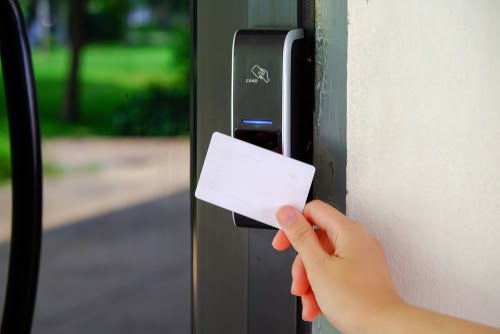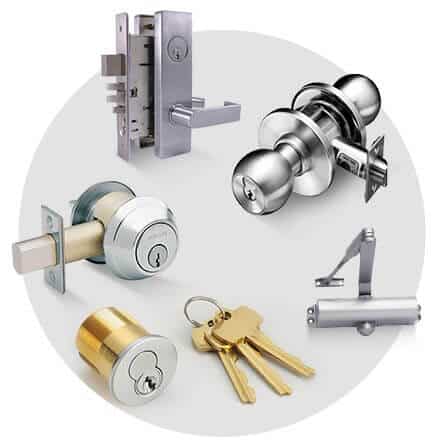Security is important to all businesses – from large corporations to locally owned mom-and-pop stores. Business owners have many responsibilities, security being a major concern for all. Businesses throughout the country benefit greatly from key control, a popular method of maintaining more control over your commercial property. Key control is essentially a system of tracking which employees have keys and what areas they have access to with those keys.

Employees account for over 40% of occupational fraud and $3.7 trillion in lost revenue each year for all businesses, according to the 2014 Global Fraud Report. Much of this fraud and lost revenue occurs because keys are issued to employees and never returned when the employees leave the company.
A key control system is critical to not only the security of a facility, personnel and equipment, but can also save you money. Key control, which ensures that certain keys are only used by authorized people, involves strategies for keeping tabs on which keys are carried by employees. Key control also involves the implementation of strategies that prevent employees from giving away duplicate keys to unauthorized users.
If you don’t have a key control system in place already, consider one for your business to increase employee safety, decrease workplace crime, and give you peace of mind.

What Are The Types of Key Control Systems?
With key control, there are mechanical systems and electronic systems. The differences between the two are as follows:
- Mechanical systems are an effective form of key control that enhances your facility’s overall security when used correctly. Simply put, these systems consist of a key with a plastic peg attached. The pegs are unique to each employee, serving to prevent keys from being removed unless the employee has the peg with specific clearance to remove it. The keys are also locked in a numbered port, and can only be removed after an access peg has been inserted. Mechanical systems help track which employees have accessed the keys, as their individual peg cannot be removed until the borrowed key is returned.
- Electronic systems are a more advanced form of key control that involve the newer technology of microchips . Keys are assigned to unique chips that are then inserted into a reader. The reader records when an authorized employee takes a key, and when it was returned. This advanced kind of key control system also lets others know which employee has a key if they request it and creates an audit trail of every key used and who used them.
What Are the Five Security Levels of Key Control?
The five security levels to key control are:
Level 5 – Key control systems with Level 5 security rely mostly on the honor system. This system has the lowest level of security and consists of unrestricted keys that employees are simply told not to make copies of. Employees are also warned not to give their keys to others and are trusted to comply with these rules, but there is no way for employers to track compliance.
Level 4 – Systems with Level 4 security involve unrestricted keys, however they are marked “do not duplicate.” This disclaimer is only semi effective, as the keys technically could still be copied anywhere. However, the majority of reputable locksmiths and key professionals will not copy them. The Associated Locksmiths of America, a nationwide trade organization for locksmiths, calls the “Do Not Copy” disclaimer a misleading tactic because it provides a false sense of security.
Level 3 – Systems with Level 3 security involve the use of restricted keys. These keys provide higher security as they can only be obtained through a single supplier. Restricted keys cannot be found at retailers, as they have to be obtained through the original source. The supplier of the key has rules set forth to prevent unauthorized duplication, giving business owners a certainty that only the keys they hand out will be able to access the designated restricted area
Level 2 – Key control systems with Level 2 security contain an even more restrictive set of keys. These are keys are patented, giving an extra boost of security as they are protected by patent law. If an individual attempts to sell or duplicate this key without getting permission from the patent holder, they could face legal penalties.
Level 1 – Systems with Level 1 security provide the highest level of security possible with a key control system. This level of security involves factory-only patented keys used to restrict access to designated areas. These keys have no possible way to be cut locally. In order to make copies, users have to send an authorization request to the original factory to have keys cut. In Level 1 systems, strict records are kept of who has access to each key, and when each key was used.
Commercial Security Locksmithing by Pop-A-Lock
A key control system will help improve the overall security of your business. Allow the knowledgeable and experienced locksmiths at Pop-A-Lock to install the right system for your business.
Pop-A-Lock is the No. 1 commercial locksmith in the United States. When you use our commercial lock services, you can rest assured that your business locks are repaired or installed correctly by highly skilled technicians.

You can rely on Pop-A-Lock® to provide high quality, professional service 24 hours a day, seven days a week. Call 1-800-POP-A-LOCK today to learn more about how can help set up the right key control system for your business.


